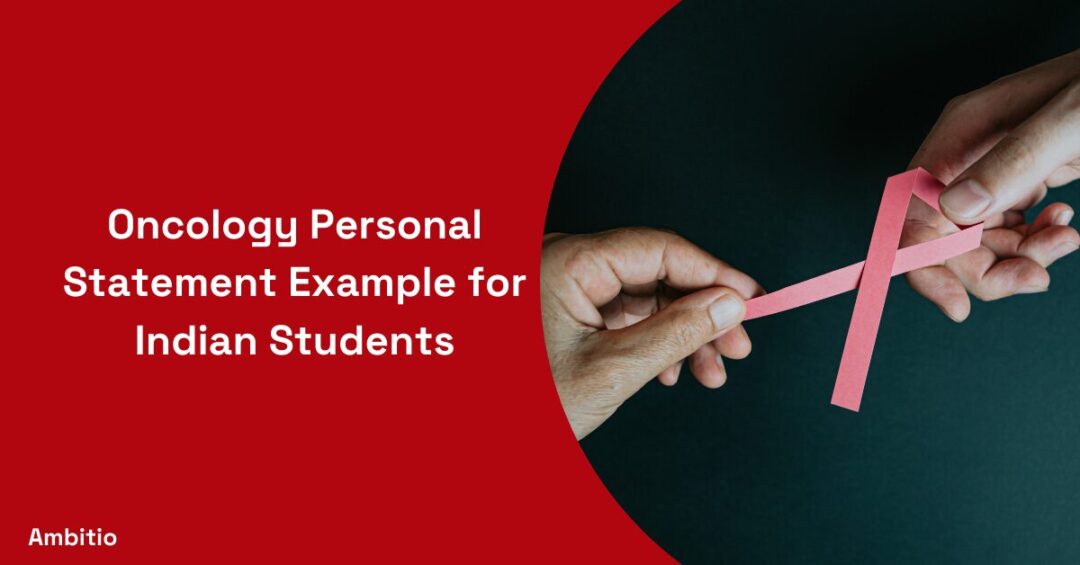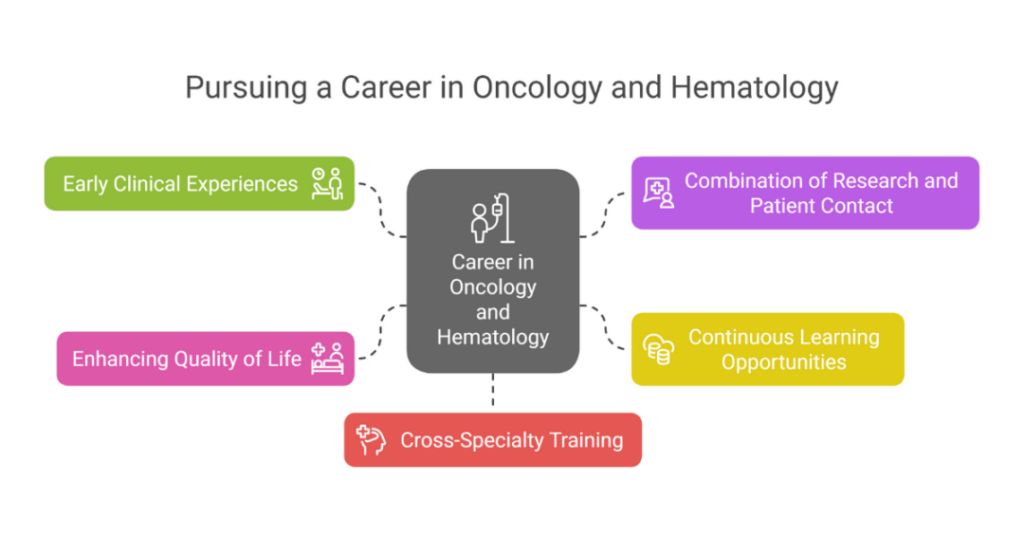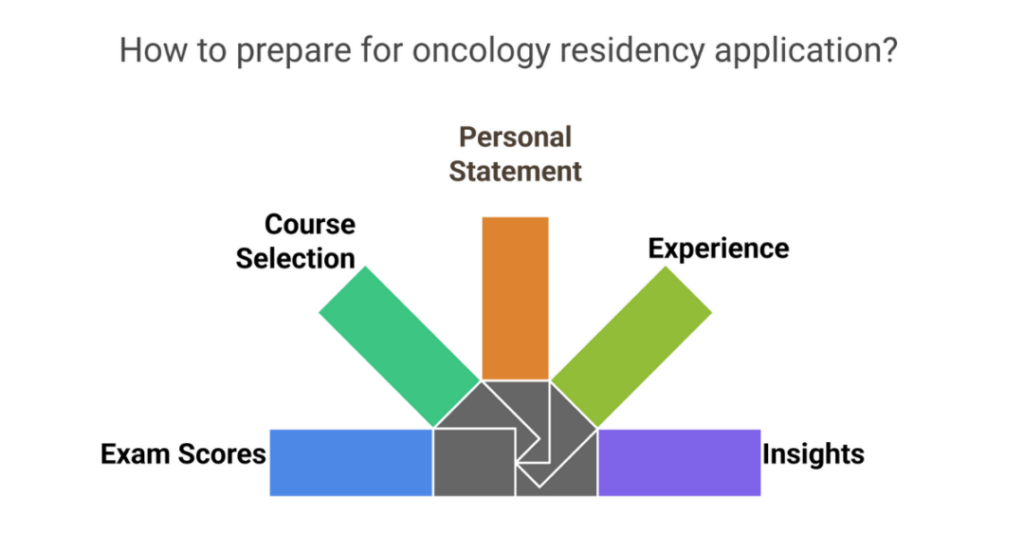16 May 2025
5 minutes read
Oncology Personal Statement Example for Indian Students

Key Takeaways
- Oncology personal statement tips for Indian students to stand out in global residency programmes with clinical experience and compassion.
- Oncology personal statement example reveals how to showcase your cancer care expertise, research background, and medical school achievements.
- Oncology personal statement writing guide helps improve admission chances by aligning your goals with top oncology and hematology specialties.
Oncology intrigues individuals for various reasons, but for Indian students, it tends to start with an individual experience. It may be observing a family member struggle with cancer or seeing the strength of patients during clinical rotations.
These experiences form the basis of an enduring dream. A good oncology personal statement conveys not only credentials, but a genuine interest in oncology, an appreciation of the treatment of cancer, and a passion for enhancing the quality of life of cancer patients.
This article examines the nuances of composing a successful personal statement, provides example personal statements, information about the residency application process, and information on fellowship and scholarship possibilities.
Let this be a mentor for those walking their way through the medical profession.
Why Pursue a Career in Oncology and Hematology?
Did you know that more than 18 million individuals globally are diagnosed with cancer every year?

That’s 18 million lives to change with a compassionate oncologist.
- Early clinical experiences during medical school are usually where the passion for oncology begins.
- Oncology is a fulfilling combination of laboratory research and patient contact.
- Cancer care is continually changing, providing unlimited learning opportunities.
- You help directly to enhance the quality of life for patients with cancer.
- It provides cross-specialty training in various specialties such as radiation oncology, surgical oncology, and pain management.
Oncology Personal Statement Example
Fun fact: The first known use of the word “oncologist” dates back to 1857, but the profession has since evolved into one of the most multidisciplinary fields in medicine.
Sample Personal Statement
From the moment I shadowed Dr. Priya at Tata Memorial Hospital during my second year in medical school, I knew oncology was my calling. Witnessing the meticulous coordination between surgical oncologists, radiation specialists, and hematologists, and her compassionate approach towards fellow patients, I became captivated by how each played a vital role in fighting cancer. That moment planted the seed for my passion for oncology.
I completed my MBBS at Christian Medical College, Vellore, where I gravitated toward clinical rotations in oncology wards. One rotation in particular, where I assisted in treating a patient with advanced thoracic cancer, reaffirmed my desire to pursue a career that combines scientific inquiry and human compassion. It taught me that treating cancer involves not just chemotherapy or surgery, but empathy, communication skills, and a holistic approach to care.
In the third year, I undertook a summer research project at AIIMS, New Delhi, focused on molecular markers in leukemia. This laboratory exposure helped me build a solid foundation in clinical and research techniques. My contributions were recognized with an undergraduate research fellowship, and I later presented our findings at the Indian Society of Hematology and Blood Transfusion Conference.
Understanding the pain of patients and the courage they show daily pushed me to volunteer with CanSupport, a Delhi-based NGO that offers palliative care. The experience taught me about pain management and communication. I learned to offer not just medical advice but emotional support, which I believe makes a physician truly impactful.
To further enhance my expertise, I undertook an elective rotation in radiation oncology at King’s College London, where I observed the UK’s multidisciplinary approach to cancer care. It broadened my clinical experiences and highlighted the importance of cross-cultural medical training. That experience solidified my desire to pursue my residency in a programme that values compassion, innovation, and evidence-based practice.
What sets me apart as an aspirant is my dedication to the field, from conducting research to building communication skills and maintaining academic excellence. I scored 326 on the GRE, and my TOEFL score is 110. I believe my conscientious work ethic, clinical skills, and passion for oncology make me a perfect match for your residency programme.
I aspire to specialize in hematology oncology, eventually pursuing a PhD to contribute to the advancement of cancer treatment. My goal is to return to India to establish a centre that focuses on early diagnosis and personalized treatment protocols.
This personal statement reflects not just my qualifications, but my unwavering commitment to making a meaningful contribution in the field of oncology.
Insights on Residency Application After Oncology
Here’s a cool stat: The demand for oncologists in the next decade is expected to grow by 48% globally. That means more chances for aspirants to step in and make a mark.
- International students often need competitive scores in IELTS, TOEFL, GRE, or GMAT.
- Choose courses that focus on specialties like surgical oncology or radiation oncology.
- Proofread your residency personal statement thoroughly.
- Highlight clinical rotations and research experience.
- Include insights from mentors or senior oncologists.

Key Considerations:
| Factor | Domestic Applicants | International Applicants |
|---|---|---|
| Exam Scores | ACT/SAT | GRE/GMAT/TOEFL/IELTS |
| Experience | Local Clinical Rotations | International Electives |
| Statement Focus | Fit and Motivation | Fit, Motivation & Visa Eligibility |
| Challenges | Competition | Visa, Cultural Adjustment |
| Opportunities | Local Scholarships | Fellowships Abroad |
How to Write a Residency Personal Statement for Oncology?
Here’s something fun: Did you know the average reviewer reads over 500 personal statements per cycle? Yours needs to shine.
- Begin with a personal story that sparked your passion for oncology.
- Focus on specific clinical experiences in oncology.
- Explain your career aspiration and how the course aligns with it.
- Highlight communication and clinical skills.
- Keep it concise, compelling, and impactful.
Scholarship and Fellowship Opportunities for Oncology
Interesting fact: The UK offers over £100 million annually in scholarships for medical students. That’s quite an opportunity for a dedicated aspirant.
- Commonwealth Scholarships offer full funding to Indian students pursuing medical education.
- Rhodes Scholarships are prestigious and competitive, ideal for future researchers.
- Chevening Scholarships include funding for courses with oncology specializations.
- University of Cambridge offers fellowships focused on radiation oncology.
- King’s College London and Imperial College London are known for their clinical research courses.
Best Universities in the UK for Oncology:
| University | Notable Programme |
| University of Oxford | Cancer Science PhD |
| University of Cambridge | Oncology Research Fellowship |
| Imperial College London | Surgical Oncology MSc |
| King’s College London | Radiation Oncology Elective |
| University of Edinburgh | Hematology Oncology MSc |
| University of Glasgow | Cancer Research PhD |
| University of Manchester | Clinical Oncology MSc |
| University of Birmingham | Translational Oncology Programme |
Conclusion
Creating the best oncology personal statement for admission starts with simplicity and finishes with punch. For each medical candidate, it’s the ideal opportunity to demonstrate commitment to the profession, clinical exposure, and empathy.
From sample personal statements to tips on residency application and scholarship opportunities, this guide did not miss a thing. Don’t forget to emphasize communication skills, dedication to cancer care, and research skills.
Make your statement careful and representative of your dream of making a difference. Proofread it carefully, be yourself, and allow your passion for oncology to radiate through.
Your career in cancer treatment begins with one great paragraph. Start that with Ambitio and give your dreams a head start!
FAQs
What should I include in my oncology personal statement for residency?
Your oncology personal statement should include clinical experiences, research work in cancer treatment, communication skills, and your motivation to specialize in oncology.
How long should an oncology personal statement be for medical school applications?
An oncology personal statement for medical school should typically be 600–800 words, long enough to cover your passion for oncology and relevant experiences concisely.
Why is an oncology personal statement important for a residency application?
An oncology personal statement is vital for a residency application because it showcases your dedication to cancer care, highlights your clinical skills, and reflects your suitability for the program.
Can I use an oncology personal statement example when writing my own?
Yes, using an oncology personal statement example can guide your structure and tone, but ensure your final version is original and reflects your unique experience in oncology.
What makes an oncology personal statement stand out to admission committees?
A strong oncology personal statement stands out by blending clinical expertise, compassionate care, and clear goals in oncology and hematology with a compelling narrative.
Where can I find a compelling oncology personal statement example for international students?
You can find a compelling oncology personal statement example in expert articles or professional writing services focused on international applicants pursuing oncology.
Should I mention cancer research in my oncology personal statement?
Yes, including cancer research in your oncology personal statement adds depth and shows your contribution to the field, which strengthens your application.

You can study at top universities worldwide!
Get expert tips and tricks to get into top universities with a free expert session.
Book Your Free 30-Minute Session Now! Book a call now




























